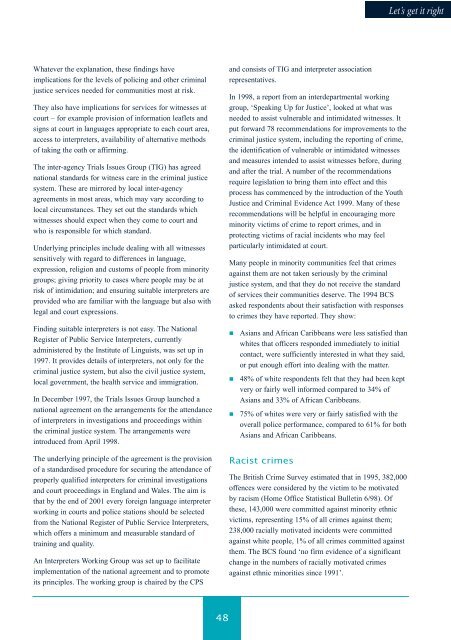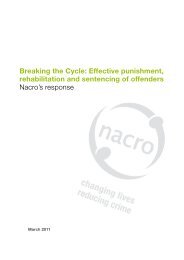Let's get it right: race and justice 2000 - Nacro
Let's get it right: race and justice 2000 - Nacro
Let's get it right: race and justice 2000 - Nacro
- No tags were found...
You also want an ePaper? Increase the reach of your titles
YUMPU automatically turns print PDFs into web optimized ePapers that Google loves.
Let’s <strong>get</strong> <strong>it</strong> <strong>right</strong>Whatever the explanation, these findings haveimplications for the levels of policing <strong>and</strong> other criminal<strong>justice</strong> services needed for commun<strong>it</strong>ies most at risk.They also have implications for services for w<strong>it</strong>nesses atcourt – for example provision of information leaflets <strong>and</strong>signs at court in languages appropriate to each court area,access to interpreters, availabil<strong>it</strong>y of alternative methodsof taking the oath or affirming.The inter-agency Trials Issues Group (TIG) has agreednational st<strong>and</strong>ards for w<strong>it</strong>ness care in the criminal <strong>justice</strong>system. These are mirrored by local inter-agencyagreements in most areas, which may vary according tolocal circumstances. They set out the st<strong>and</strong>ards whichw<strong>it</strong>nesses should expect when they come to court <strong>and</strong>who is responsible for which st<strong>and</strong>ard.Underlying principles include dealing w<strong>it</strong>h all w<strong>it</strong>nessessens<strong>it</strong>ively w<strong>it</strong>h regard to differences in language,expression, religion <strong>and</strong> customs of people from minor<strong>it</strong>ygroups; giving prior<strong>it</strong>y to cases where people may be atrisk of intimidation; <strong>and</strong> ensuring su<strong>it</strong>able interpreters areprovided who are familiar w<strong>it</strong>h the language but also w<strong>it</strong>hlegal <strong>and</strong> court expressions.Finding su<strong>it</strong>able interpreters is not easy. The NationalRegister of Public Service Interpreters, currentlyadministered by the Inst<strong>it</strong>ute of Linguists, was set up in1997. It provides details of interpreters, not only for thecriminal <strong>justice</strong> system, but also the civil <strong>justice</strong> system,local government, the health service <strong>and</strong> immigration.In December 1997, the Trials Issues Group launched anational agreement on the arrangements for the attendanceof interpreters in investigations <strong>and</strong> proceedings w<strong>it</strong>hinthe criminal <strong>justice</strong> system. The arrangements wereintroduced from April 1998.The underlying principle of the agreement is the provisionof a st<strong>and</strong>ardised procedure for securing the attendance ofproperly qualified interpreters for criminal investigations<strong>and</strong> court proceedings in Engl<strong>and</strong> <strong>and</strong> Wales. The aim isthat by the end of 2001 every foreign language interpreterworking in courts <strong>and</strong> police stations should be selectedfrom the National Register of Public Service Interpreters,which offers a minimum <strong>and</strong> measurable st<strong>and</strong>ard oftraining <strong>and</strong> qual<strong>it</strong>y.An Interpreters Working Group was set up to facil<strong>it</strong>ateimplementation of the national agreement <strong>and</strong> to promote<strong>it</strong>s principles. The working group is chaired by the CPS<strong>and</strong> consists of TIG <strong>and</strong> interpreter associationrepresentatives.In 1998, a report from an interdepartmental workinggroup, ‘Speaking Up for Justice’, looked at what wasneeded to assist vulnerable <strong>and</strong> intimidated w<strong>it</strong>nesses. Itput forward 78 recommendations for improvements to thecriminal <strong>justice</strong> system, including the reporting of crime,the identification of vulnerable or intimidated w<strong>it</strong>nesses<strong>and</strong> measures intended to assist w<strong>it</strong>nesses before, during<strong>and</strong> after the trial. A number of the recommendationsrequire legislation to bring them into effect <strong>and</strong> thisprocess has commenced by the introduction of the YouthJustice <strong>and</strong> Criminal Evidence Act 1999. Many of theserecommendations will be helpful in encouraging moreminor<strong>it</strong>y victims of crime to report crimes, <strong>and</strong> inprotecting victims of racial incidents who may feelparticularly intimidated at court.Many people in minor<strong>it</strong>y commun<strong>it</strong>ies feel that crimesagainst them are not taken seriously by the criminal<strong>justice</strong> system, <strong>and</strong> that they do not receive the st<strong>and</strong>ardof services their commun<strong>it</strong>ies deserve. The 1994 BCSasked respondents about their satisfaction w<strong>it</strong>h responsesto crimes they have reported. They show:Asians <strong>and</strong> African Caribbeans were less satisfied thanwh<strong>it</strong>es that officers responded immediately to in<strong>it</strong>ialcontact, were sufficiently interested in what they said,or put enough effort into dealing w<strong>it</strong>h the matter.48% of wh<strong>it</strong>e respondents felt that they had been keptvery or fairly well informed compared to 34% ofAsians <strong>and</strong> 33% of African Caribbeans.75% of wh<strong>it</strong>es were very or fairly satisfied w<strong>it</strong>h theoverall police performance, compared to 61% for bothAsians <strong>and</strong> African Caribbeans.Racist crimesThe Br<strong>it</strong>ish Crime Survey estimated that in 1995, 382,000offences were considered by the victim to be motivatedby racism (Home Office Statistical Bulletin 6/98). Ofthese, 143,000 were comm<strong>it</strong>ted against minor<strong>it</strong>y ethnicvictims, representing 15% of all crimes against them;238,000 racially motivated incidents were comm<strong>it</strong>tedagainst wh<strong>it</strong>e people, 1% of all crimes comm<strong>it</strong>ted againstthem. The BCS found ‘no firm evidence of a significantchange in the numbers of racially motivated crimesagainst ethnic minor<strong>it</strong>ies since 1991’.48

















